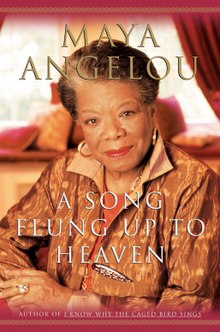 The paperback version | |
| Author | Maya Angelou |
|---|---|
| Language | English |
| Genre | Autobiography |
| Published | 2002 (Random House) |
| Publication place | United States |
| ISBN | 0-375-50747-7 |
| Preceded by | All God's Children Need Traveling Shoes |
| Followed by | Mom & Me & Mom |
A Song Flung Up to Heaven is the sixth book in author Maya Angelou's series of autobiographies. Set between 1965 and 1968, it begins where Angelou's previous book All God's Children Need Traveling Shoes ends, with Angelou's trip from Accra, Ghana, where she had lived for the past four years, back to the United States. Two "calamitous events"[1] frame the beginning and end of the book—the assassinations of Malcolm X and Martin Luther King Jr. Angelou describes how she dealt with these events and the sweeping changes in both the country and in her personal life, and how she coped with her return home to the U.S. The book ends with Angelou at "the threshold of her literary career",[2] writing the opening lines to her first autobiography, I Know Why the Caged Bird Sings.
As she had begun to do in Caged Bird, and continued throughout her series, Angelou upheld the long tradition of African-American autobiography. At the same time she made a deliberate attempt to challenge the usual structure of the autobiography by critiquing, changing, and expanding the genre. Most reviewers agreed that the book was made up of a series of vignettes. By the time Song was written in 2002, sixteen years after her previous autobiography, Angelou had experienced great fame and recognition as an author and poet. She recited her poem "On the Pulse of Morning" at the inauguration of President Bill Clinton in 1993, becoming the first poet to make an inaugural recitation since Robert Frost at John F. Kennedy's in 1961. She had become recognized and highly respected as a spokesperson for Blacks and women. Angelou was, as scholar Joanne Braxton has stated, "without a doubt, ... America's most visible black woman autobiographer".[3] She had also become, as reviewer Richard Long stated, "a major autobiographical voice of the time".[2]
The title of Song was based upon the same poem, by African-American poet Paul Laurence Dunbar, the basis of her first autobiography. Like Angelou's other autobiographies, the book was greeted with both praise and disappointment, although reviews were generally positive. Reviewers praised Angelou for "the culmination of a unique autobiographical achievement",[4] while others criticized her for coming across as "smug".[5] The 2002 spoken word album by the same name, based on the book, received a Grammy Award for Best Spoken Word Album in 2003.
- ^ "A Song Flung Up to Heaven (Book)". Publishers Weekly. 249 (5): 61. April 2, 2002.
- ^ a b Long, Richard (November 2005). "Maya Angelou". Smithsonian. 36 (8): 84.
- ^ Braxton, Joanne M. (1999). "Symbolic Geography and Psychic Landscapes: A Conversation with Maya Angelou". In Joanne M. Braxton (ed.). Maya Angelou's I Know Why the Caged Bird Sings: A Casebook. N.Y.: Oxford Press. p. 4. ISBN 0-19-511606-2.
- ^ Busby, Margaret (June 14, 2002). "I am headed for higher ground". The Guardian. London. Retrieved May 26, 2020.
- ^ McWhorter, p. 35.